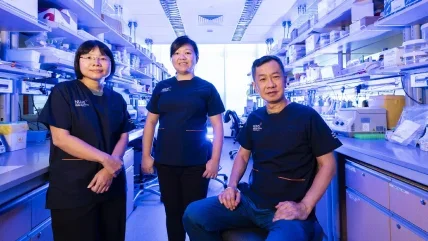
Singapore’s National University Health System (NUHS) announced that a new cell therapy showed potential in treating patients with T-cell acute lymphoblastic leukaemia (T-ALL).
The new therapy was developed by researchers at the National University of Singapore (NUS Medicine) Yong Loo Lin School of Medicine and the National University Health System (NUHS).
It is an anti-CD7 chimeric antigen receptor (CAR) T-cell therapy that works by killing the T-leukaemia cells that present CD7 protein on their surface.
The announcement is based on results from a study, recently published in the medical journal Nature Medicine.
In the study, the new CD7-targeting cell therapy showed effectiveness in patients with T-ALL, who have exhausted all standard treatment options.
Furthermore, the research is supported by the Singapore Ministry of Health through the National Medical Research Council (NMRC) Office, and MOH Holdings, among others.
NUH KTP-NUCMI and the National University Cancer Institute division of paediatric haematology and oncology senior consultant, NUS Medicine VIVA-Goh foundation professor of paediatric oncology professor Allen Yeoh said: “While we celebrate this wonderful milestone, we are only at the beginning of this exciting journey. There is a lot of scientific and medical enquiry to understand how to better use CD7 CAR T-cells.
“Each patient, in this series, taught us a lot. Ultimately, for every member of our team, seeing each patient smile and given another chance, after achieving remission, is priceless.”
Between April 2019 and October 2023, the therapy was studied on patients at the National University Hospital (NUH) in Singapore and Ospedale Pediatrico Bambino Gesù in Rome, Italy.
The study enrolled 17 participants, aged from two to 72 years, with T-ALL that could not be eliminated with chemotherapy or had relapsed after treatment.
The researchers reprogrammed the patient’s T cells to express an anti-CD7 CAR, using a technology developed at NUS Medicine, and then re-infused into the patients.
In the study, the new cancer treatment was well-tolerated, with mild side effects, and 16 of the 17 participants achieved complete remission within one month.
The leukaemic cells became undetectable even with ultra-sensitive flow cytometry tests, developed by Ms Elaine Coustan-Smith’s laboratory at NUS Medicine.
The first patient who received the new therapy has been in remission for five years, without needing additional chemotherapy or a bone marrow transplant.
The study’s first author Bernice Oh said: “This CAR-T therapy is a new and promising tool to treat T-ALL patients who have failed conventional treatment.
“These patients had exhausted all potentially curative options, and we are heartened that we could give them another clear chance at cure without severe side effects.
“We are committed to seeking better cures for patients with complex and treatment-resistant cancers.”






